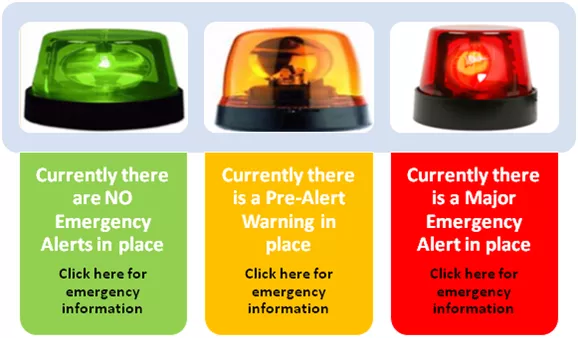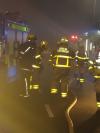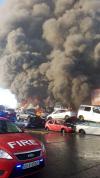Major Emergency Planning
Dublin Fire Brigade has made a plan to deal with emergencies. Emergencies happen when people and the places they live are put in danger.

But don’t worry; most of these emergencies won’t happen at all. Below is some information on planning and preparing for emergencies.
What is a major emergency?
A major emergency is...
Any event which, usually with little or no warning, causes or threatens injury or death, serious disruption of essential services or damage to property, the environment or infrastructure beyond the normal capabilities of the principal emergency services. It requires the mobilisation of additional resources to ensure an effective and coordinated response. (Framework for Major Emergency Management, 2006)
To read the full text of the Framework for Emergency management, 2006 visit the Major Emergency Management (MEM) website.
Dublin Fire Brigade (DFB) ensures preparedness for a coordinated inter-agency response to major emergencies resulting from local, regional & national events, such as fire, transportation incidents, hazardous substances incidents and severe weather events at local and regional levels in line with the Framework.
Dublin City Council Major Emergency Plan 2015
The Dublin City Council Major Emergency Plan 2015 has been prepared to facilitate the response to, and recovery from major emergencies as well as ensuring the Council’s arrangements are coordinated with those of the other designated principal response agencies (PRAs), the Health Service Executive and An Garda Síochána.
Planning and preparing for major emergencies
Dublin City Council has an ongoing major emergency planning programme in place. The programme involves:
- hazard analysis and risk assessment
- response planning
- recovery planning
- involvement in inter-agency training, exercises and regional forums
Dublin Fire Brigade provides the primary response to emergencies in the city. The Council supports this response by providing amongst others, the following functions:
- Coordinating the delivery of services from all Council departments
- Making buildings such as leisure and community centres available to people displaced by the emergency
- Providing a volunteer Civil Defence organisation
- Providing advice and assistance with clean up after major flooding or pollution
- Assessing structural damage to buildings
- Coordinating and leading multi-agency meetings to plan community recovery.
In light of the number of mass casualty incidents which have occurred across Europe, DFB in conjunction with the other PRAs, An Garda Síochána and the HSE have attended MEM planning groups and organised exercises around such incident types.
Dublin Fire Brigade co-ordinates meetings and activities of the DCC Crisis Management Steering Group including carrying out a review of the major emergency plan and severe weather plan(s). DFB has also played a major role in working with the East Regional Working Group (ERWG) to produce an annual Interagency Work Programme in line with the National Work Programme. In addition DFB actively participate in, and chair many of the ERWG sub-groups, these groups include:
- Oil Pollution Regional Sub Group
- Planning and Strategy Sub Group
- Training and Exercise Sub Group
- Voluntary Emergency Services Sub Group
- Evacuation and Rest Centre Sub Group
- Seveso Sub Group
- Mass Casualty/Fatality Sub Group
- Media & Communications Sub Group
- Air Incident Sub Group
Dublin Fire Brigade have also been active in providing training and support to the local authority crisis management teams in the East Region. During recent storms such as Ophelia and Emma DFB, along with a broad range of staff from the local authorities were at the forefront of the response.
As well as front line operational response of the fire and ambulance resources, DFB also supported the strategic management of the response operating within the DCC Crisis Management Team.
Advice to Householders
Major Emergencies are very rare events but you can take steps to make sure that you feel as safe and secure as possible. For more information and practical advice on how to cope with an emergency, visit:
- The Office of Emergency Planning homepage
- The Office of Emergency Planning, Preparing for Major Emergencies Handbook
- The Road Safety Authority, Severe Weather Advice
- Met Eireann Weather Warnings Explained
- Met Eireann Weather Warning Updates
- Department of Housing, Planning and Local Government Major Emergencies FAQs
- Be Winter Ready
- List of HSE services currently affected by major emergencies
- National Directorate Fire and Emergency Management












